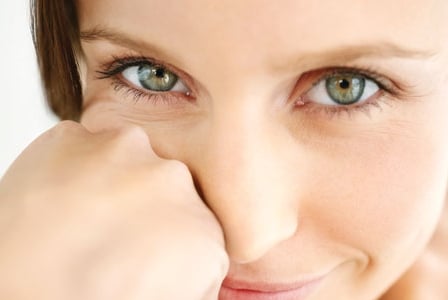
The eyes are the mirror of the soul, but sometimes they reflect our bad habits. Natural eye treatments can reduce wrinkles, dark circles, and undereye bags.
The eyes are the mirror of the soul, but sometimes they reflect our bad habits. Natural eye treatments can reduce wrinkles, dark circles, and undereye bags.
Wrinkles are one of the first signs of aging that show up around the eyes. While wrinkles are a fact of life, you can take steps to minimize them.
Wrinkles
Known in medical terms as rhytides, these creases and crevices occur as your face undergoes changes in skin and subcutaneous tissues over time, along with changes in the tone and character of facial muscles. Repetitive movements, such as smiling, frowning, and squinting, etch deep remembrances into the face.
Stay hydrated
While some of us inherit thinner, finer skin that is more prone to wrinkling, these tiny lines are often the result of dehydration caused by a dry environment, lack of hydration (water), or insufficient fats in our diet.
Feed your skin
Support the underlying structure of your skin to keep skin taut by feeding your collagen. Omega-3 fatty acid (EPA) found in fish and fish oil supports collagen production. Eat foods rich in vitamin C, including kiwi fruit, peppers, and Brussels sprouts.
Other studies support the use of dietary antioxidants, vitamins, and minerals, along with alpha-lipoic acid, pine bark extract, white tea, and grapeseed.
Dietary sugar also attaches to proteins to create molecules known as advanced glycation end products, or appropriately, AGES for short, which contribute to skin wrinkling. Alcohol, caffeine, and carbonated drinks dehydrate skin, so reduce your intake of these beverages.
Butt out
Cigarettes also rob the skin of oxygen and vital nutrients it needs to build and repair, so it’s time to kick the habit to limit wrinkles.
Prevent sun damage
Sun damage is also a factor in the wrinkled appearance of skin, most notably around the eyes. Be sure to wear UVA/UVB protective sunglasses year-round when you’re outside to cut down on squinting that can contribute to crow’s feet. Likewise, wear corrective lenses to improve vision.
Be gentle
Rubbing tired or irritated eyes can pull at delicate skin. Be gentle removing eye makeup too. Never use abrasive scrubs near the eye. Apply a lightweight, antioxidant-rich eye creme or gel to your eyes morning and night.
Dark circles
While there are many possible causes for periorbital hyperchromia (dark circles), one thing is for certain: they make us look tired, no matter how much sleep we get.
Possible causes of dark circles include:
- excess pigmentation as a result of congestion triggered by a contact or other allergy
- an excess of melanin (pigment) deposited in the skin beneath the eye
- swelling in the eye area
- shadowing due to loose skin (laxity)
- thin and translucent lower eyelid skin
- or a combination of the above
If you struggle with under-eye circles, you’ll have to identify your personal trigger(s) before you can find a remedy.
Identify allergens
Work with a health care practitioner to determine possible allergens. Support your immune system, and consider supplementing with quercetin and other bioflavonoids for their natural antihistamine properties.
Strengthen capillaries
Both vitamin C and vitamin K help build capillary strength, so eating foods high in these nutrients may help lighten the darkness.
Moisturize
Some research also suggests that topical application of vitamins C, E, and K, and retinol can help reduce the appearance of darkness under the eye.
Avoid sun overexposure
Increased melanin production caused by sun exposure can make dark circles more prominent. Use a sunscreen formulated for the delicate skin around the eyes.
Get adequate sleep
It should go without saying, but you’ll also want to make sure you are getting eight hours of sleep a night.
Under-eye baggage
Puffy eyes and under-eye bags are often related to unhealthy sleep patterns (too little or too much sleep). Excess salt intake and hormones can also play a role, with many women retaining water prior to menstruation. Puffy eyes may also result from allergies, including feather pillows and fabrics or environmental allergens, including dust and pollen.
Eat low-glycemic foods
To help even out hormones, focus your diet on natural, low-glycemic foods. To reduce eye puffiness, avoid caffeine, soft drinks, salt, and monosodium glutamate.
Stay hydrated
Be sure to drink at least eight glasses of water daily.
Adjust your sleep position
Sleep with your head slightly raised to limit the pooling of fluid around your eyes. Use an extra pillow or slightly elevate the head of the bed a few inches.
Apply the cool
To minimize morning puffiness, start your day by placing a cool washcloth or gel mask, cucumber slices, or cold camomile teabags on your eyes for about 15 minutes.
Talk to your health care practitioner about persistent eye bags, as conditions such as high blood pressure, dermatitis, kidney infections, and thyroid disorders may also be a factor.
Topical eye area treats
Look for these oils and natural ingredients in skin care products for your eyes at your natural health retailer.
Oils to smooth and soothe:
- argan
- coconut
- grapeseed
- jojoba
- rosehip
Skin-friendly nutrients:
- camomile
- green tea
- CoQ10
- vitamin E
- manuka honey
Avoid these cosmetic ingredients
| Cosmetic ingredient | What it does | Dangers |
|---|---|---|
| mineral oil |
|
|
| imidazolidinyl urea |
|
|
| propylene glycol |
|
|
| alpha hydroxy acid |
|
|
| butylated hydroxyanisole (BHA) and butylated hydroxytoluene (BHT) |
|
|
| fragrance or parfum |
|
|



